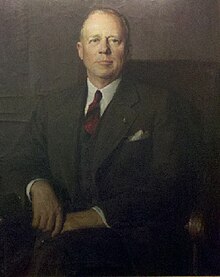Mortimer R. Proctor
Mortimer Robinson Proctor (born May 30, 1889 in Proctor , Vermont , † April 28, 1968 ibid) was an American politician and governor of the state of Vermont from 1945 to 1947 .
Early years and political advancement
Mortimer Proctor was a member of a prominent political family in Vermont. Both his grandfather Redfield , as well as his father Fletcher and his uncle Redfield Jr. were governors of Vermont. Mortimer attended Yale University until 1912 . He then worked in the family business founded by his grandfather, the Vermont Marble Company . There he made it to the position of vice-president. He was also a director of the Vermont Mutual Insurance Company and a vice president of the Proctor Trust Company . During the First World War he served as a lieutenant in the US Army in France .
In keeping with family tradition, Mortimer Proctor also became a member of the Republican Party . After holding various offices in the city of Proctor, he was a member of the Vermont House of Representatives from 1933 to 1939 . From 1937 to 1939 he was its president. Between 1933 and 1935 he was also a member of his state's education commission. From 1939 to 1941 he was a member of the State Senate . In 1940 Proctor was elected the new lieutenant governor of his state. In this capacity he was from 1941 to 1945 representative of Governor William Henry Wills , to whose successor he was elected in 1944 against the Democrat Ernest H. Bailey.
Vermont governor
Mortimer Proctor took up his new post on January 4, 1945. The end of the Second World War fell during his two-year reign . In Vermont, too, industrial production had to be reduced to meet civilian needs. The soldiers returning home had to be reintegrated into society and the invalids and the bereaved relatives of the dead had to be cared for. In addition to these war-related events, Vermont raised the minimum wage for teachers and raised pensions. Proctor also reformed the administration and set up a new agency, the Commission of State Government and Finance. During his tenure, the national debt was significantly reduced. Nevertheless, he was defeated within his party in 1946 to Ernest William Gibson , who was then elected as the new governor of Vermont in his place.
After the end of his governorship, Mortimer Proctor returned to his extensive business activities. He also founded a benefit society that promoted cultural projects in the town of Proctor. He also published some books. Mortimer Proctor died in April 1968. He was married four times and had one son.
literature
- Robert Sobel and John Raimo (Eds.): Biographical Directory of the Governors of the United States, 1789–1978. Volume 4, Meckler Books, Westport, 1978. 4 volumes.
Web links
- Mortimer R. Proctor in the database of Find a Grave (English)
| personal data | |
|---|---|
| SURNAME | Proctor, Mortimer R. |
| ALTERNATIVE NAMES | Proctor, Mortimer Robinson (full name) |
| BRIEF DESCRIPTION | American politician and governor of the state of Vermont (1945–1947) |
| DATE OF BIRTH | May 30, 1889 |
| PLACE OF BIRTH | Proctor , Vermont |
| DATE OF DEATH | April 28, 1968 |
| Place of death | Proctor , Vermont |


